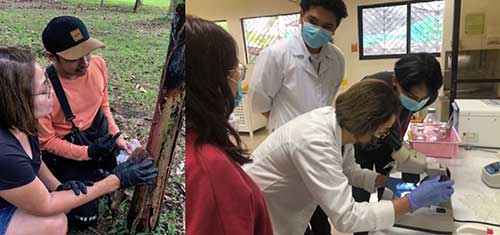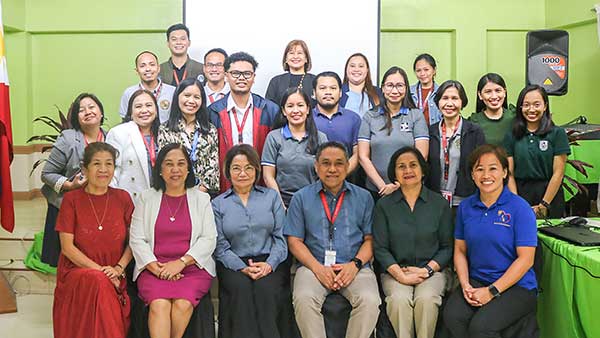Invasive gastropods remain a major threat to agriculture and horticulture. They are known to feed on plant leaves, stems, and fruits, leading to reduced crop yields and economic losses for farmers.
Although a wide range of management strategies are available, farmers continue to struggle to control these pests. Molluscicides, such as metaldehyde, are the most common management tool and although deemed effective, these can be toxic to non-target species and increase gastropod tolerance to metaldehyde.
Nematodes are considered very useful in sustainable pest management practices, particularly in managing gastropod populations in agriculture. This has been the research focus of nematologist and Balik Scientist Dr. Irma Tandingan De Ley, which she now shares with her host institutions in the Mindanao region.
Two of the world’s most invasive terrestrial gastropods are found in the Philippines namely, giant African land snail (GALS) and golden apple snail (GAS). However, gastropod research in the country only focused on GALS, with little to no attention given to slugs and their role in zoonosis or their impact on agriculture.
In Mindanao, recent observations and reports collected in vegetable and fruit nurseries and from pineapple plantation growers revealed the presence of slugs in Davao del Sur, Davao City, Bukidnon, and Zamboanga del Sur. Studies on nematodes associated with slugs are new and have just started in the Mindanao region.
Recognizing the need for training and expertise in gastropod and nematode research, Davao del Sur State College (DSSC) and the University of Southeastern Philippines (USeP) brought in Dr. De Ley as a medium-term Balik Scientist to impart her knowledge and years of experience in gastropod biocontrol using nematode Phasmarbaditis, as well as gastropod and nematode species diagnostics, taxonomy, systematics, and phylogeny.
With the support of DSSC and USeP, Dr. De Ley is spearheading the research on slugs in selected provinces of Northern Mindanao and Davao regions, focusing on their identity, diversity, and distribution using the cytochrome c oxidase subunit I (COI) mitochondrial DNA barcode. Since commencing her Balik Scientist Program (BSP) stint, Dr. De Ley, USeP, and DDSC teams have surveyed a total of six slugs and four snail species. The team recorded the first report of a cosmopolitan terrestrial slug and a slug-associated nematode in the Philippines.
Currently, she is also training and mentoring students and faculty researchers from DSSC and USeP on the improved laboratory protocols for gastropod and nematode survey, maintenance, and molecular barcoding for fast and accurate species diagnostics. For the next phase of her BSP engagement, Dr. De Ley seeks to understand invasive gastropod spread in the region and isolate and identify nematodes with biocontrol potential. With this, a safer approach to mitigate invasive gastropod species in high-value crops can be established.
Dr. De Ley holds a doctorate in Plant Pathology from the University of the Philippines Los Baños. Since 1997, she has been a member of the Department of Nematology at the University of California, where she served as an Associate Project Scientist IV until her retirement in 2023. In 2020, she was granted a US patent on the use of the CA isolates of Phasmarhabditis as a mollusk-killing biopesticide. Dr. De Ley’s initiatives are made possible through the BSP, which taps the ingenuity of Filipino scientists and experts residing and working abroad to strengthen the science and technology capabilities of local researchers and scholars addressing critical and emerging concerns in the agriculture, aquatic, and natural resources sector. (Eriza C. Asilo-Contemplacion and Jesselle S. Laranas, DOST-PCAARRD S&T Media Services)

























